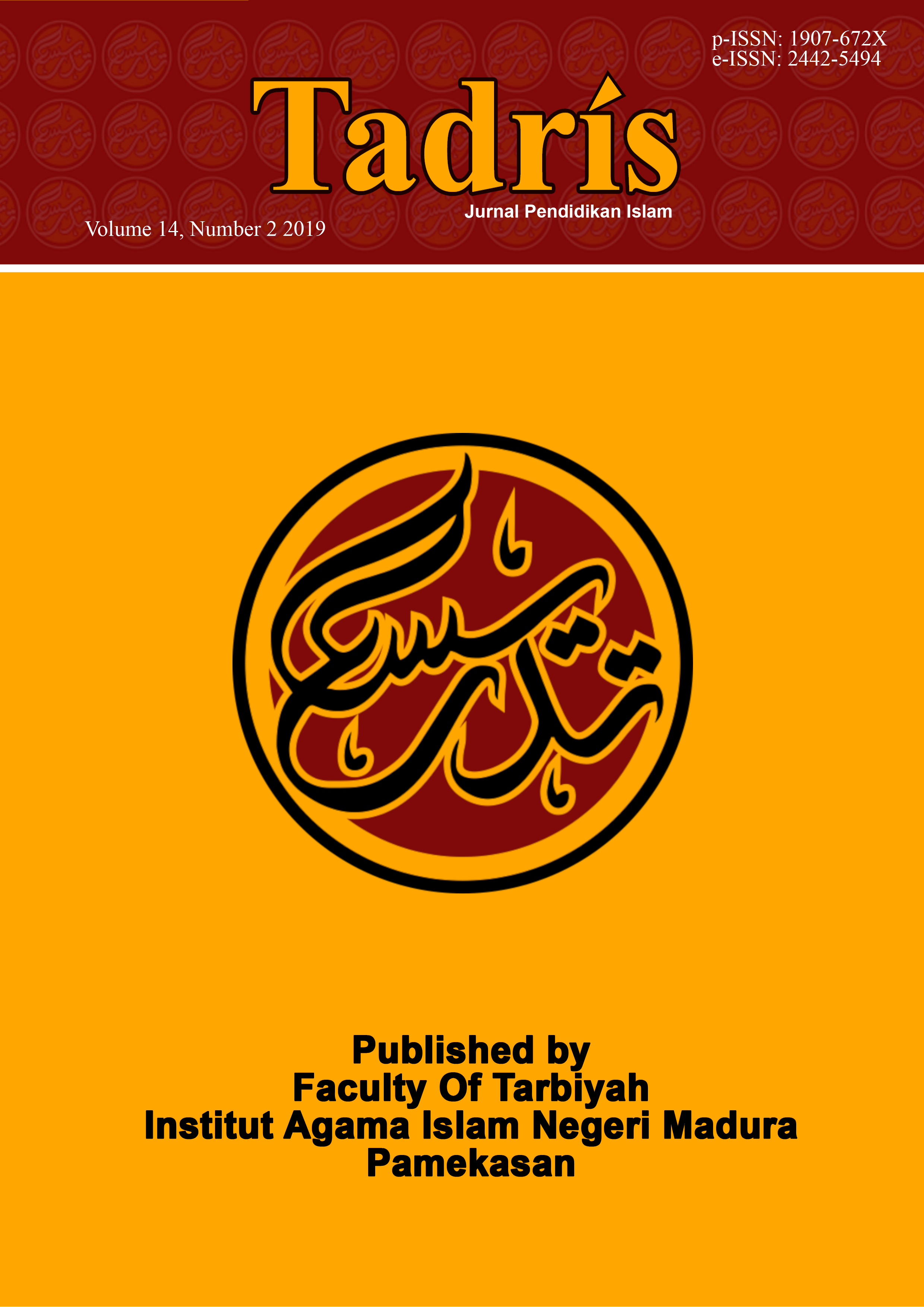Peran Lembaga Pendidikan Dalam Pengarusutamaan Islam Moderat Sebagai Upaya Melawan Paham Konservatif-Radikal
 Abstract views: 1371
,
Abstract views: 1371
,
 PDF downloads: 1177
PDF downloads: 1177
Abstract
Downloads
References
Al Qurtuby, Sumanto, 2019, “Pacifying The Radicals: Religiuos Radicalism, Islamist Militancy and Peacebuilding Approaches in Contemporary Indonesia” Journal of Southeast Asian Studies, Volume 24(1).
Anonim, “Standardization of Pesantren aimed at Mainstreaming Moderate Islam”, The Jakarta Post.
Asy’arie, Aziz, 2019, “Studi Fenomenologi Pengalaman Hijrah Mahasiswa Universitas Gadjah Mada dan Implikasinya Terhadap Ketahanan Pribadi” Master Thesis, Pascasarjana UGM.
Azra, Azyumardi, “Konservatisme Islam”, Republika.co.id.
Bertrand, Jacques, & Jessica Soedirgo, 2016, “A Threat to Stability? Islamic Extremism and Fundamentalism in Indonesia”, CIGI Papers, No. 95.
Bruinessen, Martin Van, 2011, “What Happened to the Smilling Face of Indonesian Islam? Muslim Intellectualism and the Conservative Turn in Post-Suharto Indonesia” RSIS Working Paper.
___________, 2013, Contemporary Development in Indonesian Islam: Explaining the Conservative Turn, Singapore: ISEAS Publishing.
Dinillah, Mukhlis, “ITB Bekukan Organisasi Mahasiswa yang Syiarkan Negara Khilafah”, news.detik.com.
Hanafi, Muhlis M., 2016, Islamic Moderatism and Its Role in Empowering Harmony within Society, Jakarta: Lajnah Pentashihan Mushaf Al Qur’an Balitbang dan Diklat Kemenag RI.
Hefner, Robert W., 2000, Civil Islam: Muslims and democratization in Indonesia, Princeton: Princeton University Press.
___________, 2019, “Whatever Happened to Civil Islam? Islam and Democratisation in Indonesia, 20 Years on”, Asian Studies Review, DOI: 10.1080/10357823.2019.1625865.
International NGO Forum on Indonesia Development, 2018, Urgensi dan Strategi Efektif Pencegahan Ekstremisme di Indonesia, Jakarta: Infid.
Kamdani (ed), 2007, Islam dan Humanisme: Aktualisasi Humanisme Islam di Tengah Krisis Humanisme Universal, Yogyakarta: Pustaka Pelajar.
Kementerian Agama RI, 2019, Moderasi Beragama, Jakarta: Badan Litbang dan Diklat Kemenag RI.
LPPM UNUSIA, 2019, “Islam Eksklusif Transnasional Merebak di Kampus-Kampus Negeri”, Ringkasan Laporan Penelitian.
Nuralam, Candra Yuri, “Kelompok Islam eksklusif Leluasa Bergerak di Kampus” medcom.com.
PPIM UIN Jakarta, 2018, “Ancaman Radikalisme di Sekolah”, Policy Brief Series, Issue 4, Vol. 1.
Rahmat, M. Imdadun, 2005, Arus Baru Islam Radikal: Transmisi Revivalisme Islam Timur Tengah ke Indonesia, Jakarta: Erlangga.
Schmid, Alex. P., 2017, “Moderat Muslim and Islamist Terrorism: between Denial and Resistance” ICCT Research Paper, DOI: 10.19165/2017.1.09.
Sebastian, Leonard C. & Alexander R Arifianto, 2017, “From Civil Islam Toward NKRI Bersyariah? Understanding Rising Islamism in Post-Reformasi Indonesia” ASSEHR, Volume 129.
Setara Institute, 2019, “Wacana dan Gerakan Keagamaan di Kalangan Mahasiswa”, Ringkasan Eksekutif.
Setijadi, Charlotte, 2017, “Ahok’s Downfall and the Rise of Islamist Populism in Indonesia” ISEAS Yusof Ishak Institute, No. 38.
Woodward, Kathleen E., 2015, “Indonesian School: Shaping the Future of Islam and Democracy in a Democratic Muslim Country” Journal of International Education and Leadership, Vol. 5 Issue 1.
Yakin, Ayang Utriza, 2016, Islam Moderat dan Isu-Isu Kontemporar, Jakarta: Kencana.
Yunanto, Sri, 2018, Islam Moderat vs Islam Radikal; Dinamika Politik Islam Kontemporer, Yogyakarta: Media Pressiondo.
Zuhdi, Muhammad, 2018, “Challenging Moderate Muslim: Indonesia’s Muslim School in the Midst of Religious Conservatism” Journal Religions.
Copyright (c) 2019 TADRIS: Jurnal Pendidikan Islam

This work is licensed under a Creative Commons Attribution-NonCommercial 4.0 International License.
The journal operates an Open Access policy under a Creative Commons Non-Commercial 4.0 International license. Authors who publish with this journal agree to the following terms:
- Authors retain copyright and grant the journal right of first publication with the work simultaneously licensed under a
 Commons Attribution-NonCommercial 4.0 International License
Commons Attribution-NonCommercial 4.0 International Licensethat allows others to share — copy and redistribute the material in any medium or format, and adapt — remix, transform, and build upon the material.
- Authors are able to enter into separate, additional contractual arrangements for the non-exclusive distribution of the journal's published version of the work (e.g., post it to an institutional repository or publish it in a book), with an acknowledgement of its initial publication in this journal.
- Authors are permitted and encouraged to post their work online (e.g., in institutional repositories or on their website) prior to and during the submission process, as it can lead to productive exchanges, as well as earlier and greater citation of published work (see The Effect of Open Access).














